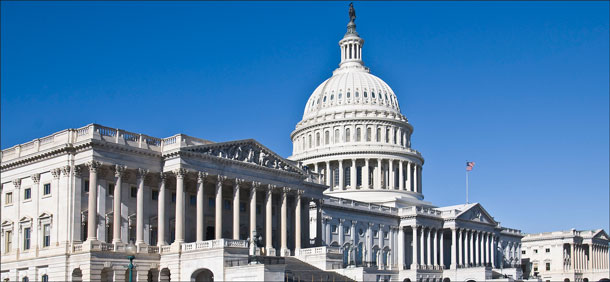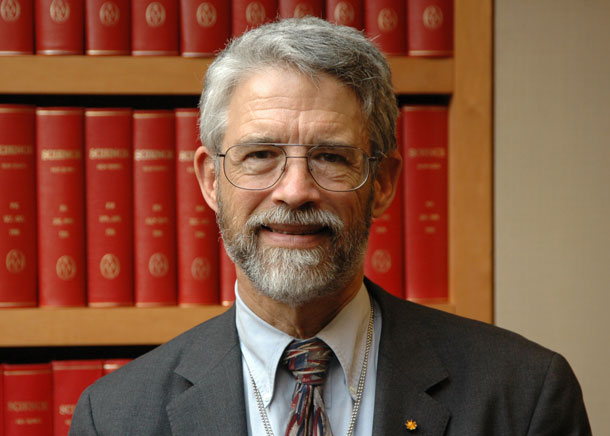Trump Climate Change Report
Air Date: Week of November 30, 2018

A US Air National Guard C-130J drops fire retardant on the Thomas Fire that raged in Southern California in 2017. The latest National Climate Assessment found that climate change has already doubled the devastation from wildfires in the Southwest. (Photo: Staff Sgt. Nieko Carzis / U.S. Air National Guard, Flickr CC BY 2.0)
The latest National Climate Assessment, assembled by 13 federal agencies, brings the most serious warning yet about the climate impacts that are already happening in the US, and the likely scenarios in decades to come. The Trump White House downplayed the dire findings as it continues to pursue rollbacks of climate protection regulations. Former President Obama’s Science and Technology Adviser John Holdren joins Host Steve Curwood to discuss the report and the options for the new Democratic-majority House Of Representatives to push for climate action.
Transcript
BASCOMB: From PRI and the Jennifer and Ted Stanley Studios at the University of Massachusetts Boston, this is Living on Earth. I’m Bobby Bascomb.
CURWOOD: And I’m Steve Curwood. The day after Thanksgiving, the Trump Administration released the government’s 4th and latest National Climate Assessment mandated by Congress. It was the result of a deep dive into the impacts of climate disruption on the US ranging from public health, the land and infrastructure.
And it finds climate change could shrink the US economy and cost taxpayers around a half trillion dollars a year by the end of the century. Despite President Trump’s stated skepticism of climate change, unlike the Bush White House, the Trump White House did not try to water down the conclusions of this report. Harvard professor John Holdren was the chief science advisor to President Obama and oversaw the work behind the 4th climate assessment until President Trump came into office.
HOLDREN: This was a report in which 13 federal government agencies participated. All of the members of the US Global Change Research Program, which was created by Congress in 1990, and has existed and functioned effectively ever since. All 13 agencies contributed to this report with their top experts on climate change and its impacts. Many senior outside experts were also engaged. The thing was reviewed by the National Academy of Sciences. It was reviewed by all 13 agencies that participated and in none of those agency reviews were any changes requested. And again, I think that was a very conscious decision, and it's to be admired that they elected not to try to change the content.
CURWOOD: So, with the Trump administration continuing to roll back policies that address climate change, looking to roll back regulations such as the Clean Power Plan and the like, to what extent do you think that this report could affect those policies and perhaps change them a bit?
HOLDREN: Well, I don't think that any single report is going to overturn the Trump administration's inclination to minimize climate change and to try to back away from the regulations that we had had in place to deal with it. I think what's happening, rather, is that each additional report is a weakening of the administration's position, and ultimately it's going to have to topple. There's going to come a tipping point where the public's demand for action is going to become irresistible. I don't know exactly when that tipping point is going to happen. But what we're seeing is report after report, each one more dire than the last about what climate change is already doing and what it will do. And at the same time, those reports are reinforced by what people are experiencing.
The people in Texas and across the Southeast who have experienced unprecedented flooding, the people in the West who've experienced unprecedented wildfires, the people across the Southwest who've experienced enormous and very damaging droughts, the people in the Northeast who've experienced more heavy downpours and more flooding. What people are experiencing and what they're seeing on their TV screens and on their computer screens and on their iPads all are converging to send the message that this is real, it's damaging, it's going to keep getting worse until we take very serious action to address that, and ultimately those convergences and the fact that many of the solutions are actually getting cheaper, wind is getting cheaper, solar energy is getting cheaper, energy efficiency is getting cheaper. The fact that the incentives to act are getting bigger and the remedies are getting cheaper is ultimately going to produce a tipping point. This report was important. The immediate past report of the Intergovernmental Panel on Climate Change in October of this year, looking at 1.5 degrees and two degrees and finding that 1.5 is much worse than the one degree Celsius that we have today. That two degree Celsius would be much worse than that. And that the only way to avoid going beyond two is to take very early and very aggressive action to reduce emissions. Then we have this new report laying out in unprecedented detail what the effects are in 10 different geographic regions of the United States across many different sectors of the economy. It just adds up and we are going to reach a tipping point.
CURWOOD: So, there has been report after report, each one seemingly more dire than the one before about the dark side of disrupting the planet’s climate; and yet not so much seems to have been done. Certainly not enough has been done to adequately meet the challenge. How do you feel about that?

The new Democratic-majority U.S. House of Representatives should prioritize passing carbon tax legislation and funding renewable energy technology, Prof. Holdren says. (Photo: Ron Cogswell, Flickr CC BY 2.0)
HOLDREN: Well, I feel terrible about it. I wrote my first articles about climate change in 1969. I think at that time, it was already becoming apparent that we were headed in a very dangerous direction. There were many others pointing out early on how dangerous the additions of greenhouse gases, of heat trapping gases to the atmosphere would become. We've known about this for a long time. Scientists have known about it for a long time. But there has been until recently, very little action. I mean, President Obama took more action, took more leadership in this domain than any president before had done, and now unfortunately, President Trump is doing his best to unravel, to roll back everything that President Obama put in place. Everything he put in place about emissions reductions, everything he put in place about adaptation, preparedness and resilience, Trump is trying to reverse, and we are losing time that we cannot afford to lose. This is really inexcusable what the Trump administration is doing.
When the Paris Agreements were reached in 2015, many people asked me, aren't you overjoyed that the Paris Agreements were so comprehensive and that 195 countries participated and agreed to their own contributions to reduce emissions? And I said, yes, I'm very, very happy, but I would have been happier if we had reached this point in 1990, 25 years earlier, when we already knew enough to embrace the kinds of measures which were finally agreed in Paris. We lost a quarter of a century and we lost it in substantial measure because of the voices of denial, the voices of waffling, the voices that said, well, we're not sure, maybe humans aren't doing it, maybe it won't do much harm, we have a lot of time to act, technology will get better so let's wait for better technology before we do anything. All of those voices together cost us 25 years and we can't make it up. We're now so far down the track toward truly disastrous climate change. And it's going to take Herculean efforts to avoid catastrophe. The good news is, I think, America's Pledge. Twenty-two states, hundreds of cities, hundreds of universities, more than 1,000 businesses, many civil society organizations, pledging that we're still in. That at all of these levels, in all these organizations across all these sectors, Americans are determined to take the measures needed to meet the commitments we made in Paris. The federal government may be out, but much of American society is still in and that at least is cause for some optimism.
CURWOOD: So, there's a new Democratic majority coming to the House in January. If they were to call you for advice, what would be the first thing that you would have the House do in terms of addressing climate disruption?
HOLDREN: Well, I think there are three major things that are needed. One is a price on carbon. I think the House should pass legislation that would create a substantial tax on carbon, which would escalate over time. The second thing that the House should do is they should pass a very large increase in funds for research and development and demonstration of advanced energy technologies, which down the road can help us reduce our emissions more deeply as is required.
The third thing that the Congress should do is pass a variety of measures making adaptation, preparedness and resilience mandatory across the government's departments and agencies. President Obama issued various executive orders that made it a requirement that every department and agency in the federal government had to take climate change adaptation, preparedness and resilience into account in every program, every project every budget; Trump has rolled all that back. Congress should put it back again.

Harvard Prof. John Holdren served as President Obama’s Science Advisor and Director of the White House Office of Science and Technology Policy during all eight years of Obama’s presidency. (Photo: courtesy of the Belfer Center for Science and International Affairs at Harvard University)
And another thing that Congress should do - which we, again, were doing with executive authority in the Obama administration - is boost efforts at climate change education. We need a public that understands more thoroughly than today's public does, how serious this problem is. Today, something like 70 percent of the American people agree that climate change is real. It's caused by humans. It's damaging. Something in the range of 70 to 80 percent believe the federal government should do more about it. But there is still not the sense of urgency which would compel action.
And we were working in the Obama administration with schools, we were working with colleges and universities. We were working with medical schools and nursing schools and schools of public health on the public health impacts of climate change, so that every student studying medicine, studying nursing, studying public health will have to take a course in the impacts of climate change on health. We were working with the National Park Service to provide materials on what climate change is doing to the national parks, so that when people go to the parks, they can actually see what's happening and understand what's happening. We should be doing all that and more to educate the public. And the Congress could insist that that needs to happen. Of course, there are many other things on the Congress’s agenda, a lot of other crazy stuff that this administration has been doing that needs to be stopped and reversed. But I certainly hope that the new Congress will give serious attention to the challenges of climate change, which are so big and coming so fast that really our only sensible option is to begin to take it much more seriously.
CURWOOD: Harvard professor John Holdren is a former Science Advisor to President Obama and Senior Advisor to the Woods Hole Research Center presidency. John, thanks so much for taking the time with us today.
HOLDREN: It's been my pleasure. Thank you, Steve.
Links
The Fourth National Climate Assessment (Vol. II)
CNN: “Fact-checking the White House push back on climate assessment”
Politico: “EPA chief: Trump administration may intervene in next climate study”
Living on Earth wants to hear from you!
Living on Earth
62 Calef Highway, Suite 212
Lee, NH 03861
Telephone: 617-287-4121
E-mail: comments@loe.org
Newsletter [Click here]
Donate to Living on Earth!
Living on Earth is an independent media program and relies entirely on contributions from listeners and institutions supporting public service. Please donate now to preserve an independent environmental voice.
NewsletterLiving on Earth offers a weekly delivery of the show's rundown to your mailbox. Sign up for our newsletter today!
 Sailors For The Sea: Be the change you want to sea.
Sailors For The Sea: Be the change you want to sea.
 The Grantham Foundation for the Protection of the Environment: Committed to protecting and improving the health of the global environment.
The Grantham Foundation for the Protection of the Environment: Committed to protecting and improving the health of the global environment.
 Contribute to Living on Earth and receive, as our gift to you, an archival print of one of Mark Seth Lender's extraordinary wildlife photographs. Follow the link to see Mark's current collection of photographs.
Contribute to Living on Earth and receive, as our gift to you, an archival print of one of Mark Seth Lender's extraordinary wildlife photographs. Follow the link to see Mark's current collection of photographs.
 Buy a signed copy of Mark Seth Lender's book Smeagull the Seagull & support Living on Earth
Buy a signed copy of Mark Seth Lender's book Smeagull the Seagull & support Living on Earth

